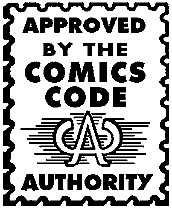Another Era Ended—Archie Comics Dismisses Comic Code Authority
For many, the seal of the Comic Code Authority that used to be boldly emblazoned on comics in the 1950s, than a tad smaller in the 1960s, is a rarely noticed icon. Yet it represented one of mass media’s earlier attempts to regulate and tame the content of a medium that was especially popular for kids.  Dr. Frederic Wertham, a New York psychiatrist, is usually credited for being the reason the code was developed. An article in Ladies Home Journal followed by a book he authored in 1954 titled Seduction of the Innocent heard Wertham proclaiming his concerns about the violent and salacious content of comic books—a media that in 1954 was being scrutinized in similar ways to which video games are examined today.
Dr. Frederic Wertham, a New York psychiatrist, is usually credited for being the reason the code was developed. An article in Ladies Home Journal followed by a book he authored in 1954 titled Seduction of the Innocent heard Wertham proclaiming his concerns about the violent and salacious content of comic books—a media that in 1954 was being scrutinized in similar ways to which video games are examined today.
Wertham’s chastisement of the popular pastime almost brought the profitable comic book industry to its knees. In response they formed an industry led organization that developed a seal that would be placed on comics with the hopes of assuring parents the content within would be suitable for all ages. Adhering to the code required authors and artists to follow a rigorous set of restrictions—many of which could be argued to have impacted or prevented even positive stories about real life situations from appearing. (Here are the details of the code.)
One of comic land’s most known and persuasive creators was also one of the first to seriously challenge the code. Stan Lee, creator of Spider-Man, took the code to task in the early 1970s when he pushed through the publication of a Spider-Man comic that featured a story about the dangers of illicit drug use. The irony was that Lee was asked by the US Government to create the story as an educational outreach to youth at the time. After Lee finished the comics (the storyline spanned a series of three releases), the Comics Magazine Association of America, the industry led body that administered the code, declined approval based on the depictions of drug use which was strictly prohibited in CCA guidelines. With the consent of his publisher, Lee pushed through the publication without the CCA seal, an act that lead to further revisions of the code.
With the passing of February 2011, so also was the passing of the Comic Code Authority. At the beginning of 2011 only two publishers, DC Comics and Archie Comics, were using the code. A few weeks later, DC said they would no longer be displaying the seal on their releases. The next day Archie Comics made a similar announcement.
Archie Comics president Mike Pellerito assures fans that their dropping the code will not affect the content of the comics.
“The code never affected us editorially the way I think it did other companies ... we aren’t about to start stuffing bodies into refrigerators or anything. We have to answer to Archie fans,” says Pellerito in an interview on newsarama.com.
Whether you see it as yet another erosion of morals and ethics within the vast media landscape or the inevitable close of a remnant of a bygone era, the Comics Code Authority seal was one of the earlier results of concerns about the effects of mass media on children.

